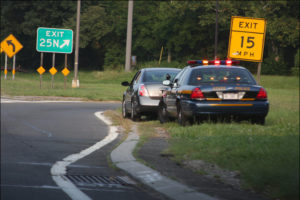Originally created to break drug lords, civil asset forfeiture or CAF has now morphed into an anything-goes situation when it comes to law enforcement confiscating cash and property. Make no mistake, CAF is a constitutional rights issue. The Fourth Amendment protects not only a person’s right to privacy but freedom from arbitrary governmental intrusions. The Fifth Amendment states that property shall not be taken without just compensation and the Fourteenth Amendment states that property cannot be taken without due process. This is why every American should care about CAF!
Here is a possible scenario: You have just taken $5,000 out of your bank account to buy a car for cash in a nearby town. Police stop you on the way for a traffic violation and you are naturally nervous just like anyone would be in the same situation. When the officer asks you if you are carrying a large sum of cash—you become more nervous and falter with the answer. The officer calls for a warrant to search you and your car and find that indeed you have a large sum of cash. The officer takes the cash and may or may not put you under arrest. Even if you are not charged with a crime, the police believe that your cash was involved in or about to be involved in a crime. In order to prove that your money was not used or would have not been used in a crime, you will now need to go to civil court to prove your cash innocent. Because it is civil court, you do not have the right to an attorney but in order to get your cash back you will probably need one. A great deal of time and money lost due to CAF.
A similar scenario happened to Las Vegas resident Salvador Franco when driving through Kansas on his way to buy a truck in St. Louis.
Did you know that in 25 states and at the federal level, law enforcement is allowed to keep 100 percent of the assets seized whether it be property or cash? The proceeds are often diverted to a special fund that can be used by the law enforcement agency with little or no public oversight. CAF is so lucrative that seized asset values increased almost ten times between 2004 and 2014 with a grand total nearing $4.5 billion. Each year, the government takes more cash and property than thieves take in property crime.
This is why reform of CAF at the national level is currently one of the highest priorities of the National Motorists Association. In a recent survey, NMA members expressed deep concern over this practice by city, state and national law enforcement. The NMA is working with a DC lobbyist to push reform at the national level. Many states also are pushing reform at the legislative level.
Kansas Governor Jeff Coyler signed a bill in April 2018 that will bring transparency to CAF in the state even though cash and property can still be taken without a conviction and law enforcement can still keep 100 percent of the proceeds.
Under the new law, Kansas law enforcement agencies must now report details about every CAF seizure conducted including where, when and the value of the property seized, if criminal charges were filed on the owner, total cost of the forfeiture action and the amount of income generated from the property. Law enforcement agencies will also need to report their CAF fund balance, total amount of deposits and list of any forfeiture-fund expenditures made. All of this information must be sent to the Kansas Bureau of Investigation (KBI) to be used in a public and transparent website.
The Institute of Justice reported they uncovered in an open documents request that between the years 2009-2015 the Kansas Highway Patrol spent over $1.36 million in state and federal forfeiture proceeds on both salaries and overtime. Also, the KHP spent nearly $2.7 million in federal proceeds that helped build a troop headquarters near Wichita. With the new law, this information would be transparent and open on the KBI website.
The new Kansas law will also help owners retake their property in a more timely fashion. Property owners will now have 60 days to file a claim and the law repeals some burdensome requirements that stop property owners from filing claims.
Despite the transparency efforts, the new law still allows a perverse incentive for police to confiscate your property.
Other states have handled this issue differently.
In 2015 for example, California police departments received $86 million in CAF dollars from the federal government. Eighty percent of proceeds from joint task forces involving the feds and local/state police were funneled back to local law enforcement agencies. In 2016, a law was passed that would close that federal loophole. State agencies would be banned from receiving any CAF funds unless the owner was convicted in an underlying or related criminal action and the cash threshold would be $40,000 instead of $25,000.
Courts sometimes are also involved in reforming CAF.
New Mexico lawmakers passed forfeiture reform in 2015. Despite the state law, the city of Albuquerque continued the practice. Two state senators sued the city in November 2015 after the city council approved $2.5 million in bonds to buy a parking lot to hold future cars seized by police utilizing CAF. In another suit, brought by a single property owner Arlene Harjo whose car was seized, stated, “The city’s 2016 budget, anticipated that $512,000 would be transferred from the local police CAF fund to pay for the salaries of two paralegals, two attorneys, two DWI seizure assistants and one DWI seizure coordinator.” In late March 2018, a judge allowed the suit to continue after strong objections from the city’s attorneys.
How can you protect yourself from CAF?
- First of all, when you are driving anywhere, don’t carry a lot of cash with you. Recommendation is $500 or less.
- Also, don’t convert your cash into pre-paid debit cards. Police can use Electronic Recovery and Access to Data or ERAD devices to take the cash from these pre-paid debit cards. Also, the devices can check your bank debit card even though they cannot take funds from your bank.
- Don’t sign any road side waivers handing over cash or property before consulting an attorney.
- Challenge the seizure in court. It is important to exercise your right in court. Do not let the police or prosecuting attorney intimidate you into not making this challenge.
- In order to prove your cash and property innocent, it might be best to hire an attorney that has experience in this area. If the amount is not that much, you might be able to make your own case in court but you would need to do your homework.
- Join the National Motorists Association to help us fight for civil asset forfeiture reform–this most egregious of constitutional violations.








